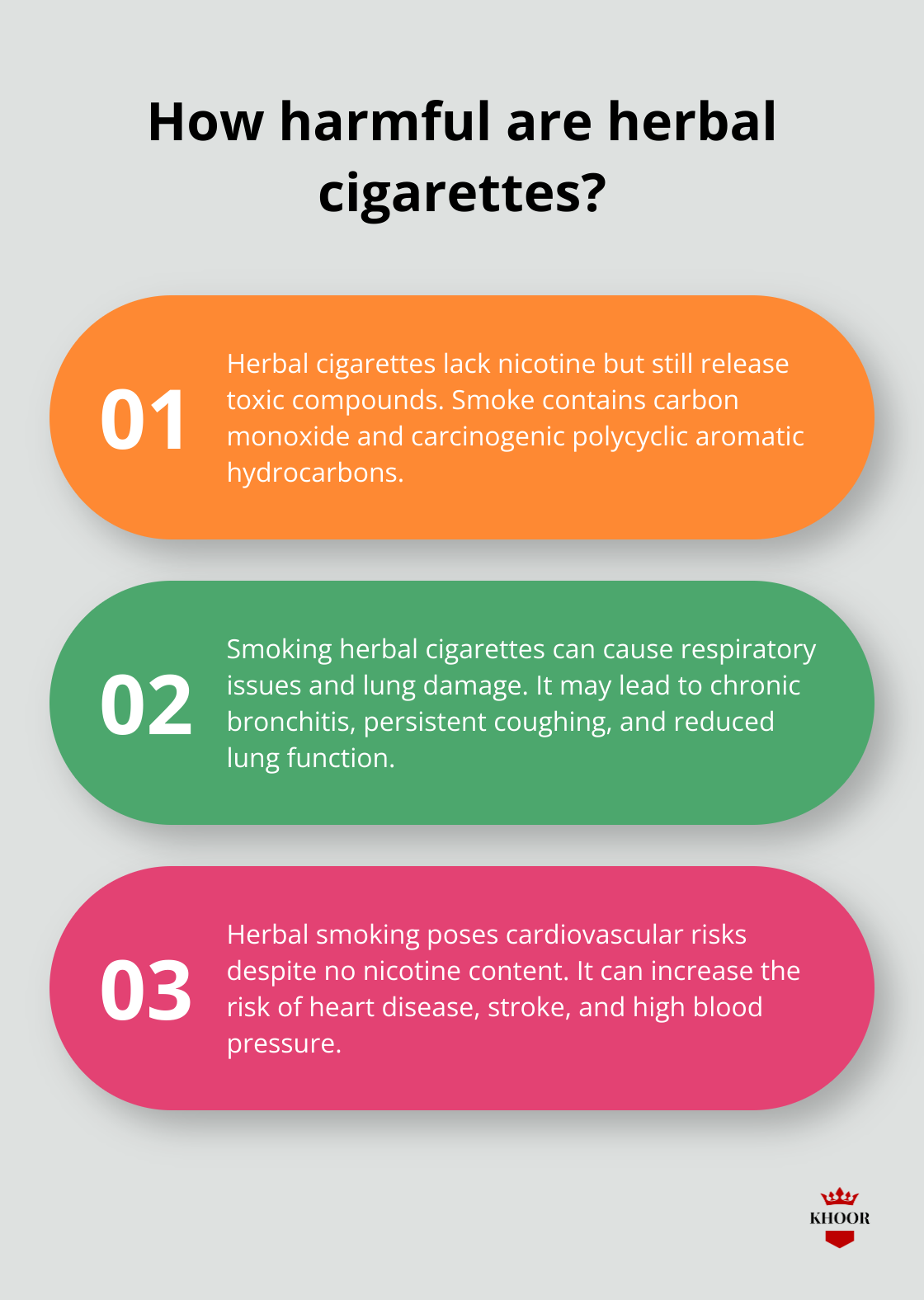
Herbal Smoking Wellness: All You Need to Know
Explore the benefits and tips of herbal smoking wellness with information on health impacts, botanical choices, and DIY blends.

At KHOOR, we often receive questions about alternative smoking options. One common query is: “Is herbal smoking good for you?”
While many view herbal cigarettes as a healthier alternative to tobacco, the reality is more complex. In this post, we’ll explore the facts behind herbal smoking, its potential impacts on health, and what you need to know before considering it as an option.
Herbal cigarettes consist of a blend of herbs and plant materials instead of tobacco. These alternatives attract those who want to quit smoking or reduce their tobacco intake. It’s essential to understand the contents of herbal cigarettes before considering them as an option.

Typical ingredients in herbal cigarettes include marshmallow leaf, passion flower, and corn silk. Some brands add mint, cinnamon, or clove for flavoring. Unlike traditional cigarettes, herbal varieties don’t contain nicotine or tobacco. The absence of nicotine serves as a key selling point for many users who try to break their addiction.
Herbal cigarettes lack tobacco and nicotine, but they aren’t harmless. The burning of these plant materials produces tar, carbon monoxide, and other toxic compounds. Some herbal smokes may produce notable metabolic problems that increase the risk of several chronic metabolic diseases.
In terms of health risks, herbal cigarettes don’t offer significant safety advantages over their tobacco counterparts. The American Lung Association warns that inhaling smoke from any burning plant material can harm the lungs and increase the risk of cancer and heart disease. The main difference lies in the absence of nicotine, which means herbal cigarettes don’t create the same addictive effects as tobacco products.
For those who seek a safer alternative, KHOOR offers premium tobacco-free and nicotine-free herbal cigarettes. These products provide a satisfying smoking experience without the harmful effects associated with traditional cigarettes. However, it’s important to note that even the safest herbal cigarettes still involve smoke inhalation, which carries inherent risks.
The decision to switch to herbal cigarettes requires careful consideration. While they may seem like a healthier option, the risks associated with smoke inhalation remain. Users should weigh the potential benefits (such as nicotine avoidance) against the continued exposure to harmful smoke compounds. As research continues to evolve, staying informed about the latest findings on herbal smoking can help individuals make the best choices for their health.
Herbal cigarettes might appear as a safer alternative to traditional tobacco, but they harbor their own set of health risks. While these products lack nicotine and tobacco, the act of smoking any plant material can seriously impact your health.

The primary concern with herbal smoking stems from the inhalation of smoke. When you light an herbal cigarette, you burn plant matter. This process releases harmful chemicals and particulates into your lungs. A study published in the Journal of Environmental Public Health revealed that herbal cigarette smoke contains many of the same toxic compounds found in tobacco smoke, including carbon monoxide and polycyclic aromatic hydrocarbons (which are known carcinogens).
Smoking herbal cigarettes can lead to significant respiratory issues. The American Lung Association states that inhaling smoke from any burning plant material can damage lung tissue and increase the risk of lung cancer. Regular herbal smokers may experience:
These effects can prove particularly severe for individuals with pre-existing respiratory conditions (such as asthma or COPD). Herbal smoking can also worsen existing lung diseases, and increase the likelihood of developing lung infections, asthma, and respiratory infections including pneumonia.
Herbal cigarettes don’t contain nicotine, but they still pose risks to heart health. The carbon monoxide produced during smoking can reduce the oxygen-carrying capacity of your blood, putting extra strain on your heart. This can lead to an increased risk of:
Many people mistakenly believe that herbal cigarettes are completely safe due to their natural ingredients. However, the act of burning and inhaling any substance can produce harmful effects. The FDA has banned use of the terms “light,” “mild,” and “low” in any cigarette labeling, including for herbal cigarettes.
The decision to switch to herbal cigarettes requires careful consideration. While they may seem like a healthier option, the risks associated with smoke inhalation persist. Users should weigh the potential benefits (such as nicotine avoidance) against the continued exposure to harmful smoke compounds.
As we explore alternatives to traditional smoking, it’s essential to understand the full spectrum of options available. In the next section, we’ll examine some potential benefits of switching to herbal cigarettes and how they might fit into a broader strategy for smoking cessation.
Herbal cigarettes provide a unique option for individuals who want to break free from nicotine addiction while maintaining the familiar act of smoking. These products contain no nicotine, which makes them attractive to smokers who aim to reduce their nicotine intake gradually. Nicotine replacement therapy (NRT) aims to temporarily replace much of the nicotine from cigarettes to reduce motivation to smoke and nicotine withdrawal symptoms.
For many smokers, the act of smoking involves more than just nicotine consumption. Herbal cigarettes allow users to keep this familiar routine without ingesting addictive substances. This aspect proves particularly helpful during the early stages of quitting when the psychological attachment to smoking remains strong.
Users often report fewer withdrawal symptoms when they transition from tobacco to herbal cigarettes. Nicotine receptor partial agonists may help people to stop smoking by maintaining moderate levels of dopamine to counteract withdrawal symptoms.
Many herbal cigarette brands (including KHOOR) use natural, plant-based ingredients in their products. This approach appeals to health-conscious individuals who prefer to avoid synthetic additives and chemicals found in traditional cigarettes.
While herbal cigarettes do not offer a magic solution, they can serve as a stepping stone in a comprehensive plan to quit smoking. These products provide a way to address both the physical and psychological aspects of smoking addiction, potentially making the quitting process more manageable for some individuals.

Herbal smoking does not provide a safe alternative to traditional tobacco. The absence of nicotine and tobacco does not eliminate the risks associated with inhaling smoke, which can damage lungs and increase cardiovascular problems. Is herbal smoking good for you? The answer remains no, as any form of smoking carries inherent health risks.

For individuals who want to quit smoking or reduce nicotine intake, herbal cigarettes might serve as a transitional tool. They allow users to maintain the familiar ritual of smoking without nicotine’s addictive properties, potentially easing the psychological aspects of quitting. However, users should not view them as a long-term solution or completely safe alternative to tobacco.
At KHOOR, we offer premium tobacco-free and nicotine-free herbal cigarettes as an option for those seeking alternatives. We recommend consulting healthcare professionals to develop a comprehensive plan for smoking cessation. This approach should address both the physical and psychological aspects of nicotine addiction (including strategies beyond herbal cigarettes).

Explore the benefits and tips of herbal smoking wellness with information on health impacts, botanical choices, and DIY blends.

Explore how KHOOR supports nicotine replacement with herbal cigarettes, success rates, and user stories for a healthier, smoke-free life.

Explore the benefits of quitting tobacco & nicotine with healthy alternatives. Improve your health and well-being with tips and data-backed advice.

Achieve your quit smoking goals with KHOOR’s supportive approach. Discover benefits, statistics, and practical tips for a healthier life.

Explore practical tips to smoke without nicotine, including product recommendations and real-life statistics to support your healthier lifestyle choices.

Explore tobacco-free alternatives with KHOOR. Learn about options like herbal cigarettes, nicotine pouches, and vaping for a healthier lifestyle.